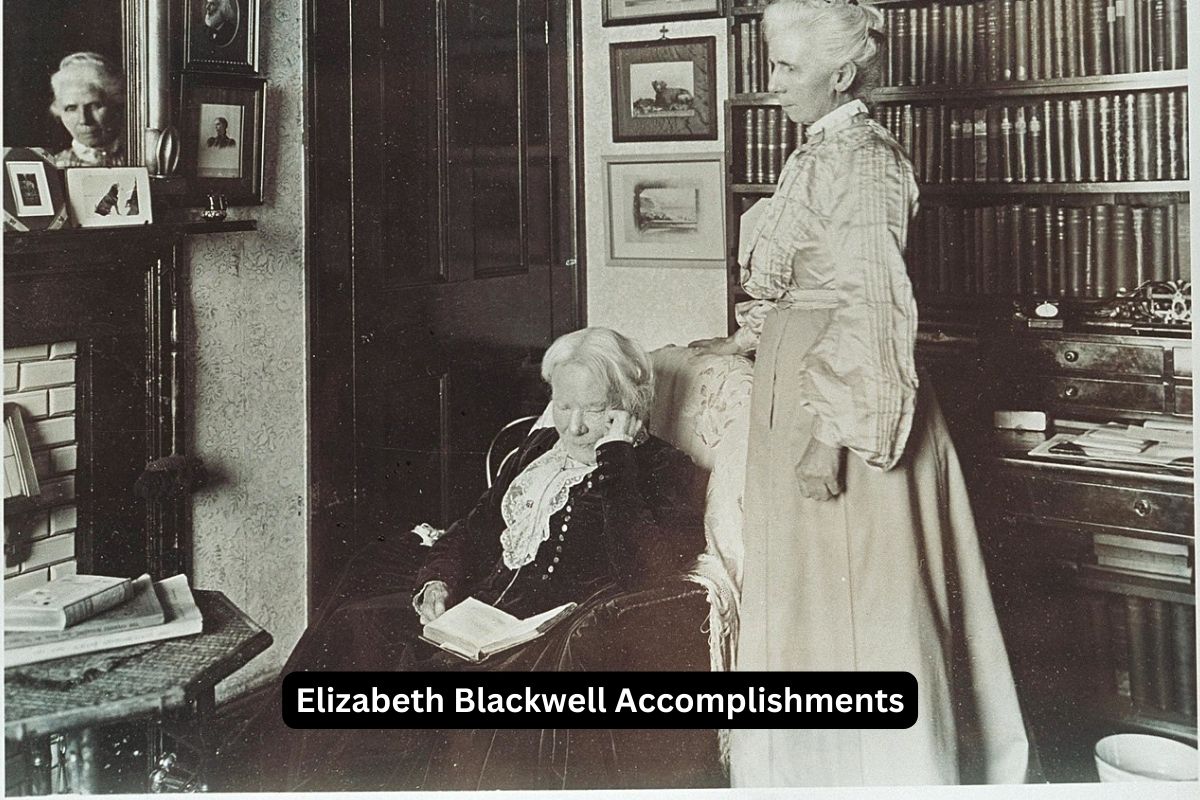Elizabeth Blackwell (1821 – 1910) was a pioneering figure in the field of medicine and a staunch advocate for women’s rights. Her groundbreaking achievements and relentless determination shattered barriers for women in the medical profession and beyond.
From becoming the first woman to earn a medical degree to establishing institutions for female medical education, Blackwell’s legacy continues to inspire and shape the landscape of gender equality and healthcare advancements.
Accomplishments of Elizabeth Blackwell
1. First woman to earn a medical degree in the U.S
In 1849, Elizabeth Blackwell achieved a groundbreaking milestone by becoming the first woman to earn a medical degree in the United States.
Her achievement was met with resistance, as medical schools at the time were exclusively male-dominated. However, her determination and exceptional academic performance led her to graduate from Geneva Medical College in New York.
Also Read: Facts About Elizabeth Blackwell
This accomplishment opened the door for women to pursue careers in medicine, challenging societal norms and paving the way for further advancements.
2. Advocated for women’s admission to medical schools
fter experiencing the challenges of being the only woman in her medical school, Blackwell became a fervent advocate for the admission of women to medical institutions.
She believed that women’s unique perspectives and skills could contribute significantly to the medical field.
Also Read: Timeline of Elizabeth Blackwell
Through her writings and speeches, Blackwell encouraged the acceptance of female students in medical schools, eventually leading to the transformation of medical education to be more inclusive.
3. Co-founded the New York Infirmary for Women and Children
In 1857, Elizabeth Blackwell and her sister, Emily Blackwell, along with Dr. Marie Zakrzewska, established the New York Infirmary for Women and Children.
This institution provided medical care specifically for women and children, offering a safe and supportive environment for female patients who often faced discrimination in traditional medical facilities.
The infirmary also served as a teaching hospital for female medical students, enabling them to gain practical experience while breaking down gender barriers in healthcare.
4. Established Women’s Medical College with her sister
Elizabeth Blackwell, along with her sister Dr. Emily Blackwell and Dr. Marie Zakrzewska, founded the Women’s Medical College in New York in 1868.
This institution was a significant step forward in providing formal medical education exclusively for women. It aimed to address the lack of opportunities for women to pursue medical studies and foster a supportive learning environment for female students.
The college played a crucial role in training a new generation of women physicians, furthering the advancement of women in the medical field.
5. Wrote books and gave lectures on health and women’s rights
Throughout her life, Elizabeth Blackwell used her platform to advocate for both health-related matters and women’s rights.
She authored several books, including “Pioneer Work in Opening the Medical Profession to Women” (1895), which documented her experiences and efforts in overcoming gender barriers in medicine.
Blackwell also delivered lectures on topics such as hygiene, public health, and women’s roles in society. Her writings and speeches not only educated the public but also inspired others to challenge societal norms and push for gender equality.
6. Fought for women’s rights and gender equality
Elizabeth Blackwell was not only a pioneer in medicine but also a dedicated advocate for women’s rights and gender equality. She believed that women should have access to education, professional opportunities, and equal treatment.
Blackwell’s activism extended beyond the medical field, as she actively participated in suffrage movements and supported causes that aimed to improve the status and rights of women.
Her determination to challenge societal norms and push for change contributed to broader shifts in attitudes toward women’s roles and capabilities.
7. Practiced medicine despite discrimination
Despite facing discrimination and challenges, Elizabeth Blackwell continued to practice medicine throughout her life. She focused on areas such as women’s health, maternal care, and children’s health.
Her dedication to patient care and her innovative approaches to medical practice helped to advance the quality of healthcare and contribute to medical knowledge in various fields.
8. Founded London School of Medicine for Women.
In 1874, Elizabeth Blackwell founded the London School of Medicine for Women in the United Kingdom.
This institution was the first medical school in the UK to train women as doctors. Blackwell’s experience in overcoming challenges and establishing medical education opportunities for women in the United States inspired her to extend her efforts to the UK.
The London School of Medicine for Women played a crucial role in advancing women’s access to medical education and breaking down gender barriers in the medical profession internationally.
9. Emphasized public health and hygiene
Throughout her career, Elizabeth Blackwell recognized the importance of public health and hygiene in preventing disease and improving overall well-being. She was a vocal advocate for cleanliness, sanitation, and preventive measures.
Blackwell’s emphasis on these aspects of healthcare contributed to greater awareness of public health issues and influenced the development of practices that would later become integral to healthcare systems worldwide.
10. Inspired women to pursue medical careers
One of Elizabeth Blackwell’s enduring legacies is the inspiration she provided to countless women who aspired to enter the medical profession.
Her achievements demonstrated that women were capable of excelling in traditionally male-dominated fields and that their contributions were invaluable to society.
Blackwell’s accomplishments and her advocacy for women’s rights motivated generations of women to pursue medical careers, challenge gender norms, and make their mark in various professional domains.
